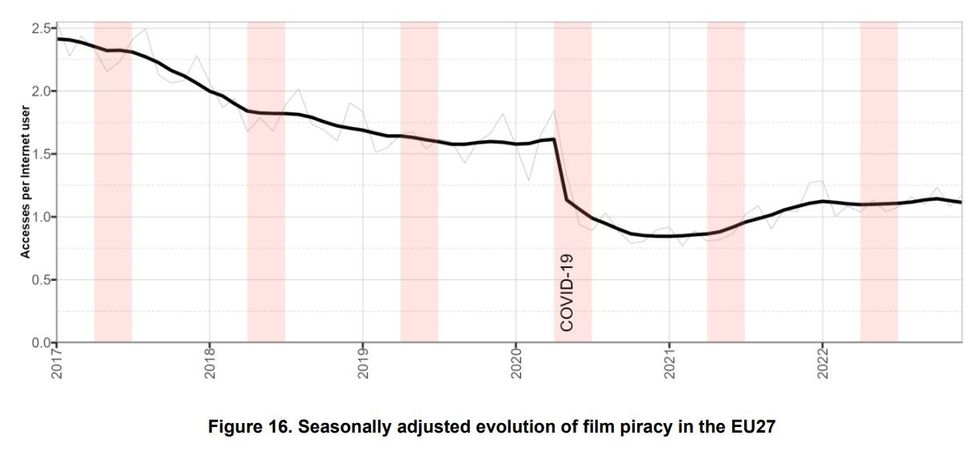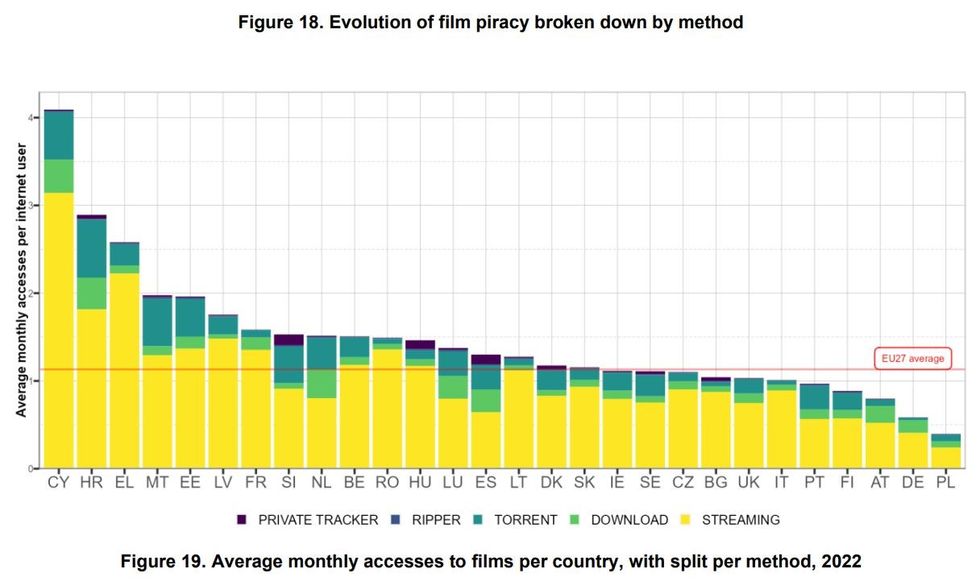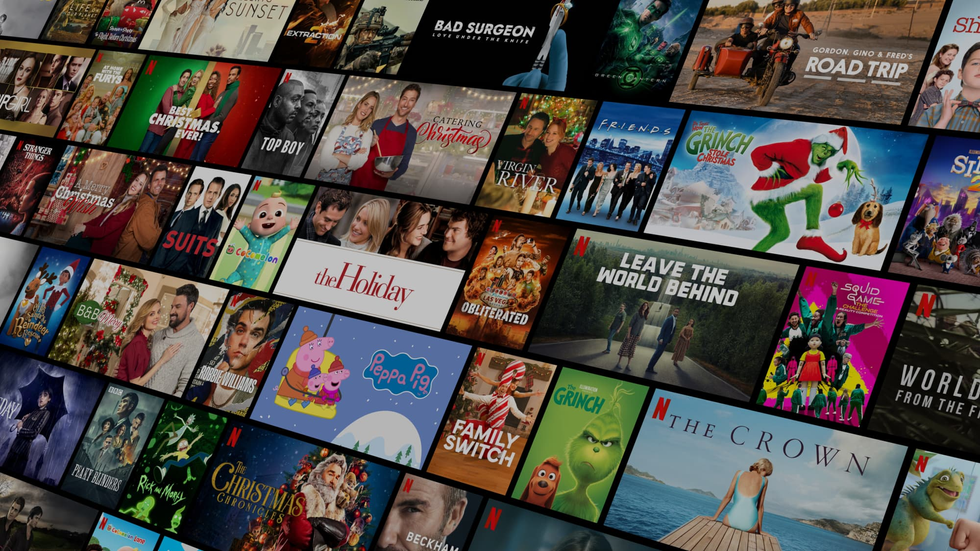After bottoming out in 2021, rates of online piracy have been steadily climbing across the UK, mainland Europe, and the United States of America in recent years
GETTY IMAGES | GBN
"This is just the start of our enforcement efforts, with more actions planned"
Don't Miss
Most Read
Trending on GB News
We've seen a flurry of activity across the UK in a bid to stamp out illicit streaming. Law enforcement worked with anti-piracy organisation FACT and Sky TV to execute a nationwide operation, closing 3,000 adverts on social media for illegal IPTV services offering cut-price access to Sky Sports and other pay-TV channels, cease-and-desist orders handed to 40 individuals from Essex to Dundee, and three arrests.
Fire TV Sticks — designed, built, and distributed by teams inside Amazon — were in the crosshairs of this latest operation, since this low-cost is often used by criminals to offer illicit ways to stream at a fraction of the cost. Dubbed "fully loaded" Fire TV Sticks, these modified devices will sometimes ship with an annual subscription fee to access films, shows, and sports from Sky TV — although it'll always undercut the best Sky Stream deals.
Speaking about the latest anti-piracy effort, FACT Chief Executive Kieron Sharp cautioned: "The rise in illegal IPTV operators using modified Firesticks to unlawfully access premium content is a growing concern. This not only infringes upon copyright laws but deprives content creators and distributors of their rightful earnings and disrupts the economic balance of the creative industry.
"FACT and our partners are steadfast in our commitment to disrupt these criminal operations. This is just the start of our enforcement efforts, with more actions planned."
With further crackdowns planned, why is piracy such a growing concern again?
A winning combination of tough restrictions on the most popular piracy resources — a High Court order forced the biggest broadband providers in the UK to block access to file-sharing site The Pirate Bay back in 2012 — and the proliferation of easy-to-use streaming services with vast catalogues, like Netflix, caused piracy rates to drop throughout the 2010s.

Research published by the European Union Intellectual Property Office shows a steady decline in the number of films pirated across Europe in the last 7 years — with the biggest drop during Covid-19 restrictions
EUROPEAN UNION INTELLECTUAL PROPERTY OFFICE
By 2017, The Software Alliance, an organisation based in Washington DC dedicated to combating online piracy, reported that the number of pirated films had plummeted by 37%. And according to figures from the European Union Intellectual Property Office, piracy bottomed out in 2021.
However, online piracy is on the upswing again.
A recent report from The Daily Beastbelieves some of the responsibility for this worrying trend rests with the streamers themselves. In a rush to replicate the success of Netflix, a slew of new streamers have entered the market, including Disney+, Paramount+, MGM+, Prime Video, Apple TV+, discovery+, Shudder, HayU, and more.
Many of these companies used to license their TV shows, films, and documentaries to Netflix — before pulling the titles to strengthen the catalogue available on their own bespoke streaming service. Some of these brands are beginning to U-turn on this strategy, but it's left it much harder (and more expensive) to watch the boxsets and blockbusters that everyone is talking about at the water cooler in the office.
Worse than this fracturing of streaming libraries across a growing number of streamers all demanding between £4.99 and £10.99 per month, The Daily Beast article points the finger at media executives making some content unavailable without resorting to piracy.
Westworld, the big-budget science-fiction show from Jonathan Nolan that premiered on HBO in the US was pulled from Max after its fourth and final season. At the time of writing, it's not available to watch on the streaming service owned and operated by the broadcaster that made it.
Likewise, Warner Bros. killed off Batgirl and Coyote vs. Acme after both films were completed to obtain a $30 million tax write-down. Disney+ and Paramount+ have conducted similar (albeit smaller) purges.

Piracy in the UK is still below the average rate across the 27 member states of the European Union, with torrents and downloads still surprisingly popular compared with illicit streaming
EUROPEAN UNION INTELLECTUAL PROPERTY OFFICE
With nowhere else to turn to watch some of these properties, viewers have been forced to look at illicit methods. Filmmaker Alfred Giancarli has voiced sympathy, stating: "Subscribers feel exhaustion and frustration when they can’t access ‘their content,’ or when titles—even titles produced for a streaming service — are dropped from that streaming service, or when titles bounce around from one streamer to another.
"I think there are lots of reasons why people download or use digital file sharing to access movies. From ease-of-use, cost- and space-saving, because the film may not be available where they live or may be too expensive to obtain through traditional means."
MUSO, which specialises in content protection and piracy intelligence, found that piracy rates declined over the Covid-19 pandemic across Europe. However, since the lifting of lockdown restrictions, there has been a steady uptick in the number of people turning to illicit streams and downloads.
Research from MUSO shows one of the driving factors behind piracy rates is the income level of country. Low per capita income as well as a high degree of income inequality and high youth unemployment are all associated with increased consumption of pirated content.
Geography is another critical factor.
Film studios cut media-distribution deals for defined periods in each country. So, while one distributor might manage the rights in the United States for the next 10 years, the same movie will be handled by another company in Europe and Asia for a shorter period. It's the reason why some TV shows, films, and documentaries will appear in the Netflix catalogue in the UK, but not in the USA.
Original productions commissioned by the streamers themselves, like Stranger Things and Bridgerton for Netflix and The Mandalorian on Disney+ are becoming increasingly popular since these can be distributed worldwide.
Apple TV+ has a catalogue that's only made from original productions, so it's streaming library is consistent across the globe. With no licensing deals, TV shows won't vanish at the end of a two-year deal — leaving you unable to watch the finale.
LATEST DEVELOPMENTS
- We had our minds blown by Apple Vision Pro, and now YOU can too
- Mid-contract broadband price rises OUTLAWED by Ofcom
- Best VPN deals
- Best Sky Stream deals
- Missing next Samsung Galaxy update could have dire consequences
If your favourite film or TV show is no longer available on a streamer in your country, you might want to buy a DVD or Blu-ray disc. However, a growing number of studios aren't bothering with physical releases these days.

Once the only streamer in town, Netflix has been forced to increase its own output as some of the biggest Hollywood studios reclaimed their licensed content to stock-up their own rival streamers
NETFLIX PRESS OFFICEWith no recourse — what option to film fans have left other than to steal?
“The streaming industry has to converge towards a system where consumers can watch pretty much everything they like for an affordable price,” Van der Sars, who writes for trade publication TorrentFreak, told The Daily Beast. "That sounds straightforward, but in an industry that’s built around licensing silos with billions in revenue at stake, that’s easier said than done."








